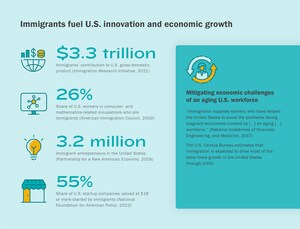BOSTON, May 16, 2023 /PRNewswire/ -- The latest Analysis Group report on the Regional Greenhouse Gas Initiative (RGGI) finds the cap-and-invest program added $669 million in net economic value and nearly 8,000 job-years to participating states from 2018 to 2020, and includes for the first time a review of RGGI states' actions to address environmental justice (EJ) concerns and provides a framework to advance these equity priorities.
"The Economic Impacts of the Regional Greenhouse Gas Initiative on Ten Northeast and Mid-Atlantic States," authored by Daniel Stuart, Ph.D., and Paul Hibbard of Analysis Group, one of the largest international economics consulting firms, is the latest in a series of reports analyzing and documenting RGGI's impact on member states (CT, DE, MA, MD, ME, NH, NJ, NY, PA, RI, VA, VT).1 The authors find that, over its 12-year history, RGGI has contributed to a 46% reduction in carbon emissions, generated $3.8 billion in allowance proceeds, produced $5.7 billion in net economic benefits, and added 48,000 job-years.2
"Throughout its history, RGGI has delivered numerous benefits to Connecticut and the other participating states, including lower energy bills for our residents and businesses, new jobs in our growing clean energy industries, and reductions in climate-damaging, health-harming pollution. As the RGGI states move forward, we continue to explore ways to build on these successes and make further progress towards our climate and equity goals." – Katie Dykes, Chair of the RGGI, Inc., Board of Directors and Commissioner of the Connecticut Department of Energy and Environmental Protection
During the most recent three-year compliance period (2018–2020), this trend continued, with RGGI both reducing carbon emissions and providing net economic benefits for member states. Overall, RGGI delivered $15 in economic value added per capita over this period.
"Although the original focus of the RGGI program was to address carbon emissions, we have consistently found that the cap-and-invest program results in a net positive economic impact for participating states," said Paul Hibbard, report co-author. "Our analysis shows that the regional cap works to limit carbon pollution, and the investment of auction proceeds plus the program's impacts on the power sector result in overall reductions in electricity usage, additional income for consumers and business owners, and new jobs."
Additionally, for the first time, the Analysis Group report includes a review of how RGGI states are addressing EJ and equity issues in overburdened communities.
"Even though the electricity sector has made significant progress in reducing emissions in the aggregate, existing policies and the RGGI framework do not fully address the fundamental problem of unequal pollution burden among communities," noted Devashree Saha, senior associate at World Resources Institute and a member of RGGI's technical advisory group. This report highlights a number of steps that RGGI states can pursue to ensure that the benefits from reducing dangerous pollutants reach everyone and RGGI's emissions reduction policies are just and equitable."
The report finds that RGGI states have increasingly recognized the need to address historic and ongoing environmental justice concerns in overburdened communities in tandem with their overarching climate goals, and outlines how RGGI states could leverage auction proceeds to mitigate environmental, health, economic, and other harms. For instance, RGGI dollars could be invested in ambient air pollution monitors in overburdened communities. RGGI states could also require a minimum proportion of investments from RGGI auction proceeds flow to overburdened communities, and these states could set up public dashboards to track and report on this spending to ensure minimum standards are met. RGGI states could also require opportunities for EJ communities to participate in the regulatory process of reviewing environmental permits or spending plans for RGGI auction proceeds.
"Beyond the environmental and economic benefits of RGGI, we found that the program can dovetail with RGGI states' equity goals as well," noted Daniel Stuart, report co-author. "RGGI auction proceeds could go toward mitigating the health, economic and environmental harms that disproportionately affect overburdened communities. We know there's more we can do, and the report outlines some additional tools and approaches states can take to complement existing initiatives."
This Analysis Group report is an independent project of the RGGI Project Series, and available for free download here.
To learn more about Analysis Group's capabilities, visit AnalysisGroup.com.
About Analysis Group:
Analysis Group is one of the largest international economics consulting firms, with more than 1,000 professionals across 14 offices in North America, Europe, and Asia. Since 1981, we have provided expertise in economics, finance, health care analytics, and strategy to top law firms, Fortune Global 500 companies, and government agencies worldwide. Our internal experts, together with our network of affiliated experts from academia, industry, and government, offer our clients exceptional breadth and depth of expertise.
About RGGI
The Regional Greenhouse Gas Initiative (RGGI), the first regional cap-and-invest program in the United States, is a cooperative, market-based effort among the states of Connecticut, Delaware, Maine, Maryland, Massachusetts, New Hampshire, New Jersey, New York, Pennsylvania, Rhode Island, Vermont, and Virginia to cap and reduce CO2 emissions from the power sector. Power plants buy allowances at quarterly auctions and RGGI states receive the proceeds, which are typically invested in communities to fund clean-energy programs, jobs training, energy-efficiency measures, and bill assistance for businesses and residents.
About the RGGI Project Series
The RGGI Project Series provides science-based, nonpartisan research and analysis projects by independent experts, intended to tackle and improve understanding of the critical climate change and clean energy issues facing the states and stakeholders today. Launched in 2011, the Series aims to inform and stimulate public dialogue and provide a resource for sound policy decisions.
Contacts:
Amanda Kolling | [email protected] | 304-942-7148
Carrie Cullen | [email protected] | 862-881-9277
_____________________________________
1 For the economic analysis of this report, all RGGI member states that participated in an auction during the fourth compliance period from 2018-2020 are included, excluding Virginia and Pennsylvania. Virginia and Pennsylvania are included in the discussion of key equity priorities.
2 A job-year is the equivalent of one full-time job for the duration of one year.
SOURCE Analysis Group

WANT YOUR COMPANY'S NEWS FEATURED ON PRNEWSWIRE.COM?
Newsrooms &
Influencers
Digital Media
Outlets
Journalists
Opted In





Share this article